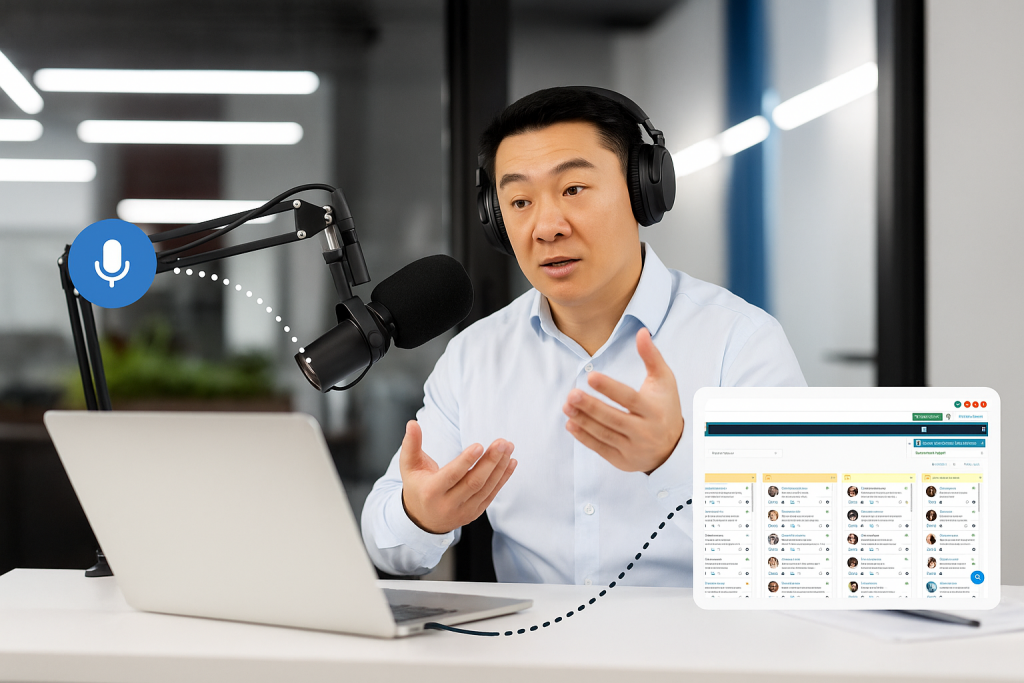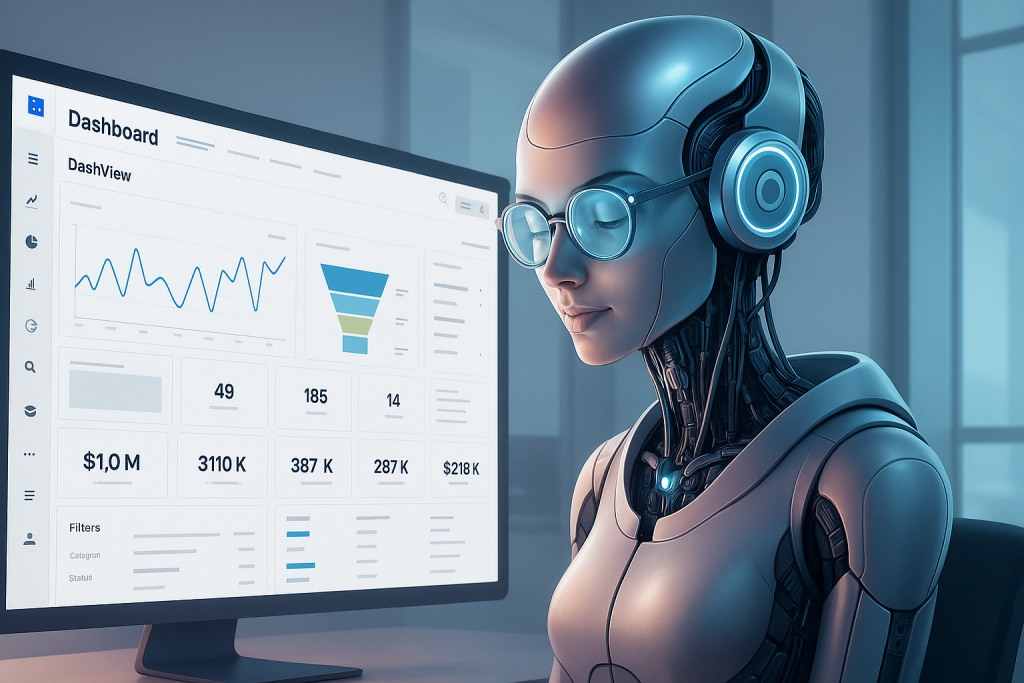🎧 Prefer to listen? This article is also available as a podcast episode. Listen to “The AI Edge” here →

GoHighLevel just launched their MCP Server, and most agencies have no idea what this means for their business.
Here’s what it means: AI can now work directly inside GoHighLevel sub-accounts. Not alongside them. Not integrated with them. Actually working in the sub-accounts – whether that’s your agency’s own sub-account or your clients’ sub-accounts – executing the same tasks your team currently does manually.
Your team (or you) spend hours every day logging into sub-accounts to search contacts, update records, send messages, manage opportunities, and pull reports. These routine CRM operations consume time that could be spent on impactful human activities that drive revenue.
The MCP Server changes this. AI agents can now access 21 of the most in-demand GoHighLevel functions across any sub-account – from contact management to payment processing – and execute these tasks intelligently based on context and objectives.
This allows AI agents (like Claude Opus or Sonnet) to think, decide, and act within GoHighLevel sub-accounts based on voice or text commands.
The agencies that understand this shift will capture competitive advantages that seem impossible today. Those who don’t will spend the next few years wondering why their competitors are scaling faster while working less.
The Silent Revolution Most Agencies Will Sleep Through
A quiet revolution is reshaping how AI integrates with business systems. It’s called the Model Context Protocol (MCP), and GoHighLevel just announced their own MCP server integration.
This isn’t another automation tool or workflow enhancement. This is the infrastructure that transforms AI from a helpful assistant into an intelligent agent that can actually work in you or your clients’ business systems, executing tasks based on voice or text commands.
The stakes couldn’t be higher. Industry data shows that 78% of organizations now use AI in at least one business function, while 82% plan to integrate AI agents within 1-3 years. The AI agents market is projected to reach $47.1 billion by 2030, growing at 45.8% annually.
Yet here’s the problem: 99% of agencies are still thinking about AI as a fancy chatbot or content generator. They’re missing the fundamental shift from “if this, then that” automation to intelligent agents that can observe, plan, and act autonomously.
Those who recognize this shift early will outcompete the rest by margins that seem impossible today.
What MCP Actually Means (Stripped of All the Tech Jargon)
Forget everything you’ve heard about “Model Context Protocol” sounding technical and complicated. Here’s the simple truth that changes everything:
MCP is “agents with tools.”
That’s it. That’s the revolution.
Instead of building rigid automation workflows where every possible scenario must be programmed in advance, you’re creating an AI agent that has access to your GoHighLevel account and can perform tasks on your behalf rather than you having to go into the system to do it manually.
Here’s a concrete example: You finish a sales call and feed the transcript to your AI agent. The agent analyzes the conversation, drafts a follow-up email based on the transcript, waits for your approval, then searches for that contact in your GHL system and sends the email on your behalf. It updates the contact’s notes with relevant details from the call, sets a follow-up task based on what was discussed, and can even reschedule appointments if that came up in the conversation.

This is the difference between programming specific actions and having an intelligent assistant that understands your business context.
The technical details don’t matter right now. What matters is understanding that GoHighLevel’s MCP server gives AI agents direct access to your client’s contacts, calendars, payments, messaging, and every other tool in the platform.
The Perplexity Lightbulb Moment
Perplexity built a billion-dollar platform by giving their AI one single tool: the ability to search the internet before responding. While the early days of ChatGPT were marked by hallucinated answers, Perplexity’s search function allowed them to provide accurate, real-time information. This one tool difference enabled them to scale to a billion-dollar valuation.
One tool. Billion-dollar valuation.
That’s the power of giving AI agents access to external systems. Perplexity didn’t just create a better search engine – they created an intelligent agent that knows when to search and how to synthesize information.
Now ask yourself: What happens when AI agents have access to every tool in your client’s GoHighLevel account?
What happens when an agent can:
- Get calendar events and appointment notes to understand context
- Search and fetch contact details from your database
- Add and remove tags based on behavioral triggers
- Send messages into existing conversation threads
- Create and update opportunities in your sales pipeline
- Process and track payment transactions
- Search opportunities by custom criteria
- Update contact records with new information automatically
All based on voice or text commands. All based on intelligent decision-making rather than predetermined rules.
Every single one of these actions currently requires you or someone on your team to log into GoHighLevel, navigate to the right section, find the relevant information, and execute the task manually. Now imagine all of that happening intelligently in the background while you focus on impactful human activities that drive revenue.
This isn’t speculation. GoHighLevel’s MCP server makes exactly this possible, with 21 integrated tools available right now through their hosted server at services.leagueconnectorhq.com/mcp. (Click Here To Setup Your HighLevel MCP Server)
The tools span everything your clients use daily: calendar management, contact operations, task handling, messaging, opportunity tracking, and payment processing. These aren’t new features – they’re the same CRM functions your team currently handles manually, now accessible to AI agents that can execute them intelligently.
Why This Creates Impossible Competitive Advantages
The agencies that understand this shift first won’t just get a head start. They’ll establish moats that competitors can’t cross.
Here’s why: When you can deploy AI agents that actually work in your GoHighLevel systems, you’re not just automating tasks anymore. You’re transforming how you operate your agency. The hours you currently spend on routine CRM operations get freed up for revenue-generating activities. Your capacity to manage clients scales without hiring proportionally. Your ability to respond quickly to client needs improves dramatically.
This operational efficiency becomes your competitive advantage.
Your current process might require you to log into a client’s account, search through contacts, pull conversation history, and manually craft follow-up messages. With MCP, you simply tell the AI agent what you need, and it handles the execution while you move on to your next revenue-generating activity.
This isn’t about doing the same work faster. It’s about providing a fundamentally different level of service that justifies premium pricing while reducing your operational overhead.
Sam Altman recently said that “it is the era of the idea guy” – meaning the competitive advantage goes to those who can envision and execute solutions, not those who get bogged down in technical implementation.
MCP gives agencies the ability to be idea guys who can actually execute those ideas through intelligent systems.
The Definition That Matters More Than Any Technical Manual
Everyone’s trying to define AI agents with complex technical explanations. Here’s the only definition that matters for agency owners:
AI agents are models using tools in a loop.
They can spend as much time as they need in each step. They can use tools over and over again until they complete the objective. Then they send out the final result.
This “loop” concept is what differentiates true AI agents from basic automation. Your current workflows execute once and stop. AI agents iterate until they achieve the desired outcome.
When you start thinking of yourself as an “orchestrator of AI agents” rather than a “builder of workflows,” everything changes. You’re not programming specific actions – you’re setting objectives and letting intelligence figure out the execution.
The more tools you give these agents access to, the more intelligent their solutions become. But here’s the critical insight that most agencies will miss: the more tools you give an agent without corresponding instructions, the more confused it gets.
This is where your expertise as an agency becomes invaluable. You understand your processes and systems well enough to provide the context and instructions that turn raw AI power into focused business intelligence.
The “Janky” Advantage That Won’t Last Forever
Here’s something most people won’t tell you about cutting-edge technology: it’s janky at first. MCP implementations aren’t perfect yet. The tools sometimes have limitations. The integrations occasionally need troubleshooting.
Most agencies will use this “jankiness” as an excuse to wait until everything is polished and perfect.
That’s exactly backwards.
The agencies building the biggest competitive advantages are those who embrace the jank and understand that it’s temporary. Every breakthrough technology goes through this phase – and those who adopt during the janky period get maximum leverage when it becomes mainstream.
Think about early websites, mobile apps, or social media marketing. The agencies who started experimenting when these technologies were imperfect established thought leadership and developed expertise that became incredibly valuable as adoption exploded.
The same pattern is happening with MCP. The technology works, but it requires agencies who understand both the possibilities and the limitations. Those agencies will develop the expertise and case studies that position them as leaders when MCP becomes standard.
The Future State That Should Guide Every Decision Today
Imagine this: You or your clients never have to think about their systems again while AI handles execution.
You write a message in Claude: “Update the opportunity stage for John Smith to ‘Proposal Sent’ and add a note about his pricing concerns.” The AI agent searches your contacts, finds John Smith, updates his opportunity stage (which triggers your existing automation sequences), and adds the detailed note – all while you focus on your next revenue-generating activity.
This isn’t about replacing your workflows. It’s about making them smarter and more responsive through AI powered commands.

Everything gets organized perfectly into your GoHighLevel account. You never touch the system directly.
This isn’t science fiction. This is the immediate future that MCP enables today.
The agencies who position themselves as orchestrators of this intelligence will command premium pricing while reducing their operational burden. You’ll attract clients who want outcomes, not processes.
The Choice That Defines Your Agency’s Future
The window for establishing MCP-powered competitive advantages is open right now. GoHighLevel’s MCP server is live. The tools work. Early adopters are already building case studies.
But this window won’t stay open forever.
Within 12-18 months, MCP will likely become table stakes for competitive agencies. The advantage will go to those who develop expertise now, while the technology is still giving early adopters disproportionate returns.
You have two choices:
Choice 1: Wait until MCP becomes mainstream, then compete with every other agency trying to catch up.
Choice 2: Start experimenting with MCP integration now, develop real expertise, and establish yourself as a leader in AI-powered agency services.
The agencies making Choice 2 will be the ones defining the future of the industry. They’ll command premium pricing, attract better clients, and build sustainable competitive moats.
Those making Choice 1 will spend the next few years playing catch-up in an increasingly competitive market.
The technology is ready. The opportunity is clear. The only question is whether you’ll act quickly enough to capture the advantages available to early adopters.
Because in the era of AI agents working in business systems rather than alongside them, the agencies who orchestrate intelligence will outcompete those still building workflows by margins that seem impossible today.
The choice is yours. But choose quickly.
The future belongs to the orchestrators.

